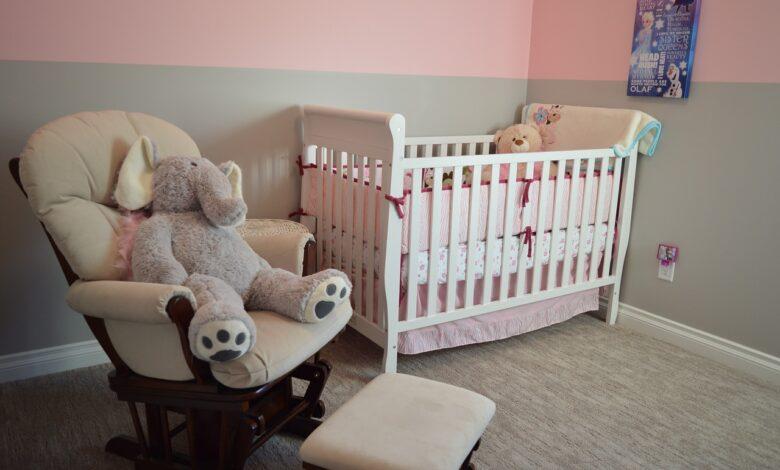Crib Dream Meaning : What Does It Mean ?

Dreams can often be mysterious, leading us down paths of discovery to understand their deeper meanings. Have you ever dreamt of a crib and pondered its symbolism? The “Crib Dream Meaning” is a topic many wonder about. Dive with us into this world of subconscious messaging to unravel the mysteries of crib-related dreams.
Remember that nostalgic feeling when you see a crib? They’re not just for babies. For many, cribs are a potent symbol in our dreams, representing various facets of life. Our minds use symbols like cribs to communicate feelings, fears, or memories.
So, when you think, “What’s the Crib Dream Meaning?”, you’re tapping into a profound sphere of subconscious narratives. But to truly grasp its essence, we should look into different interpretations and cultural significances.
Interpretations of Crib Dreams
When it comes to deciphering the “Crib Dream Meaning,” there’s no one-size-fits-all. A myriad of interpretations exists, depending on the dreamer’s personal experiences and feelings. Here are some detailed interpretations of what a crib could signify in your dreams:
- Security and Comfort:
- Safe Haven: Just as a crib offers a confined space for a baby, it can symbolize the safe corners of our mind where we seek refuge.
- Emotional Solace: A dream of a comfortable crib can imply a period of peace or a longing for simpler times.
- Nurturing Environment: It might also indicate that you’re in a phase where you’re nurturing an idea or emotion and want to keep it protected.
- New Beginnings:
- Start of a Journey: A baby’s life starts in a crib. Hence, seeing one might mean you’re embarking on a new journey or phase.
- Rebirth: The crib can also denote personal growth or evolution, symbolizing rebirth or a fresh perspective.
- Hope & Potential: Just as a crib holds potential in the form of a baby, it might signify upcoming opportunities.
- Feelings of Vulnerability:
- Dependency: Like an infant relying on caretakers, a crib dream might hint at feeling dependent or powerless in certain situations.
- Isolation: Sometimes, the crib’s confining space can represent feeling isolated or disconnected from the outside world.
- Past Traumas: Our vulnerabilities often stem from past traumas. A crib can bring forth those hidden memories, urging introspection.
- Personal Growth & Development:
- Stages of Life: Since a crib is associated with the initial phase of human life, it can signify the different stages or milestones of your personal or professional journey.
- Maturity: The transition from a crib to a bed is a significant one, symbolizing maturity or the need to take on greater responsibilities.
- Foundational Memories: Cribs might stir memories of foundational experiences that have shaped our core beliefs and attitudes.
- Unrealized Desires or Fears:
- Parental Instincts: For some, especially those yearning for parenthood, a crib can symbolize unrealized desires or maternal/paternal instincts.
- Loss or Grief: An empty crib, especially, can depict feelings of loss, grief, or missed opportunities.
- Anxieties: Given that cribs are related to the vulnerability of a child, it might also mirror anxieties about protection or the well-being of loved ones.
Dreams are incredibly subjective. Thus, while these interpretations provide a framework, the true meaning often lies intertwined with personal experiences and emotions. Reflect upon your life’s current circumstances and emotions to find what resonates with you.
What is the Symbolism of Crib?
The symbolism of the crib, as with many dream symbols, is deeply rooted in various cultural, psychological, and personal contexts. When it comes to “Crib Dream Meaning,” this symbolism can provide valuable insights into the subconscious mind. Here’s an expanded look at what the crib can represent:
- Growth and Development:
- Lifecycle Reflection: Cribs witness our most vulnerable phase – infancy. It represents the early stages of life, hinting at personal growth and transformations.
- Evolutionary Process: From lying down to sitting up, and then standing, the crib observes our initial physical and cognitive evolution.
- Innocence and Potential: The infancy phase is brimming with potential. A crib, therefore, can also symbolize untouched potential or opportunities waiting to be seized.
- Protection and Security:
- Guardian Symbols: Much like how a crib encompasses a baby, it symbolizes things, people, or situations that keep us protected from potential harm.
- Safety Nets: In the broad strokes of life, we often have safety nets – be it family, friends, or personal beliefs. A crib can be a nod to these protective layers.
- Boundaries: While protection is vital, sometimes the crib’s barriers might symbolize self-imposed limitations or fear of stepping out of one’s comfort zone.
- Transition and Change:
- Life Milestones: The move from a crib to a bed is a child’s first significant transition, highlighting growth. Similarly, in dreams, it can reflect personal progress or upcoming changes.
- Evolution of Beliefs: Much like how a child outgrows a crib, the symbol can represent outgrowing old beliefs or habits.
- Anticipation: Transition phases are filled with anticipation of the unknown. A crib can also signify looking forward to new experiences with both excitement and anxiety.
- Foundation and Stability:
- Fundamental Beliefs: Our foundational years shape many of our core beliefs. A crib can represent these deeply rooted beliefs or values.
- Grounded Feelings: A sturdy crib is symbolic of stability and being grounded. Dreaming of it can indicate a solid foundation in life or the desire for one.
- Origins and Roots: On a more profound level, cribs can hint at origins, heritage, or seeking connections with one’s roots.
- Fertility and Creation:
- Birth and Creation: Given that cribs are directly related to new life, they can symbolize birth – not just in the literal sense but also the birth of ideas, projects, or new phases.
- Desires and Yearnings: For those wishing to start a family or embrace a nurturing role, a crib can symbolize these desires.
- Cycles of Life: A crib, being the starting point of human life, can represent the cyclical nature of life, emphasizing beginnings and the promise of future growth.
Remember, symbolism is a tapestry woven from personal experiences, cultural narratives, and individual emotions. While these interpretations provide a roadmap, your personal feelings and life context will determine the true symbolism of the crib in your dreams.
Common and Typical Dreams of Crib
Dream landscapes are vast and varied. When considering the “Crib Dream Meaning,” there are several common scenarios that individuals often report. Each scenario carries its own set of implications and potential interpretations. Here’s a deeper dive into typical crib dreams and what they might signify:
- Empty Crib:
- Loss or Absence: An unoccupied crib can signify feelings of loss, whether it’s the loss of a loved one, missed opportunities, or unfulfilled desires.
- Void or Loneliness: The emptiness might reflect a current state of emotional loneliness or feelings of isolation.
- Anticipation: Alternatively, it could denote anticipation for something new, like expecting a baby or a new project.
- Rocking Crib:
- Comfort and Reassurance: A gently swaying crib can depict feelings of comfort, warmth, or being soothed in challenging times.
- Rhythms of Life: It can also symbolize the steady rhythms of life and consistent patterns.
- External Forces: If the crib rocks violently, it might represent external disturbances or unpredictabilities in life.
- Broken or Damaged Crib:
- Insecurity: A crib in disrepair can symbolize feelings of insecurity, instability, or being unprotected.
- Broken Foundations: Given the foundational role of cribs, a damaged one might denote shaken core beliefs or values.
- Challenges: It could also hint at upcoming challenges or disruptions that might throw you off balance.
- Crib with a Crying Baby:
- Unaddressed Needs: Much like how a crying baby needs attention, this might symbolize unmet needs or desires in your life.
- Stress or Anxiety: A crying baby can also represent personal stress, anxieties, or overwhelming emotions.
- Call to Action: It might be an urging from the subconscious to address certain issues or concerns.
- Oversized or Oddly Shaped Crib:
- Feeling Out of Place: An unusual crib might reflect feelings of being out of place, not fitting in, or confronting unfamiliar situations.
- Growth and Expansion: An oversized crib could symbolize growth, expansion, or the need to grow beyond current confines.
- Challenging Norms: It could also represent a call to challenge norms, think outside the box, or embrace unique perspectives.
- A Crib in Unusual Locations:
- Adventure and Exploration: A crib in a forest, beach, or mountain might signify a journey, exploration, or adventure in your life.
- Misplaced Priorities: Finding a crib in odd places might hint at feelings of being out of sync, having misplaced priorities, or needing realignment.
- Unexpected Opportunities: It could also suggest surprising opportunities or situations presenting themselves in unlikely places.
Dreams, with their rich tapestry of symbols, often act as mirrors, reflecting our innermost thoughts, feelings, and fears. While these common scenarios offer a guide, your personal emotions, experiences, and current life situations will give the most accurate interpretation of your crib dreams. Remember, dreams speak a language of their own, and it’s up to us to decipher it.
Crib in Dream: Themes & Visions
Dreams often weave intricate stories that meld various symbols together. When considering the “Crib Dream Meaning,” it’s worth noting that cribs can feature in dreams alongside other symbols, adding layers of complexity to their interpretation. Let’s delve into some crib-related dream scenarios and their potential meanings:
- Crib Near a Window or Balcony:
- Exposure to External World: This might symbolize a bridging between the internal, protected world and the vastness of the external universe, reflecting a desire to explore or connect.
- Seeking Clarity: The clarity of a window pane might hint at seeking transparency in situations or wanting to get a clearer perspective.
- Balancing Act: Being near an open space like a balcony could imply balancing safety with risks, comfort with challenges.
- Decorating or Preparing a Crib:
- Anticipation: Just as expecting parents prepare a crib for their baby, this could signify preparation for a new phase, project, or opportunity.
- Personal Touch: Decorating often involves adding a personal touch, reflecting a desire to influence or customize an aspect of your life.
- Setting Foundations: Getting a crib ready might symbolize establishing a strong foundation or groundwork for upcoming endeavors.
- Moving a Crib from One Room to Another:
- Transition Phases: This act can depict moving from one phase of life to another, emphasizing growth and development.
- Shift in Priorities: Physically moving a crib might mirror shifting priorities, responsibilities, or roles in life.
- Adapting to Change: It could also signify adaptability, flexibility, and the need to adjust to new environments or situations.
- Crib Surrounded by Toys and Mobiles:
- Childhood Memories: Such a setting can evoke nostalgic feelings, hinting at connections to past memories or a desire to reconnect with childlike wonder.
- Stimulation and Growth: Toys and mobiles are tools for a child’s cognitive and emotional growth. This could symbolize seeking stimulating environments or experiences.
- Joy and Playfulness: A crib laden with toys might hint at seeking joy, fun, and breaking the monotony of life.
- Crib in Water or Floating:
- Emotional Depths: Water in dreams often represents emotions. A crib in water could indicate deep-seated feelings, emotional turmoils, or navigating the complexities of emotions.
- Seeking Stability: If the crib floats, it might symbolize a quest for stability amid chaotic or overwhelming situations.
- Subconscious Dive: Water also relates to the subconscious. A crib in such a setting might signify exploring deeper layers of the mind or unearthing hidden memories.
- Finding Multiple Cribs in a Room:
- Multiplication of Roles: This could depict juggling multiple roles, responsibilities, or opportunities.
- Choices and Decisions: Multiple cribs might also symbolize crossroads, having various options, or making significant decisions.
- Diverse Aspects of Life: It could represent different facets of your life, each needing attention, care, or nurture.
When analyzing crib-related dreams, it’s essential to consider the accompanying symbols, emotions felt during the dream, and current life situations. These dreams often provide a multidimensional lens, offering insights into various areas of life. As always, personal introspection will yield the most resonant interpretations.
Psychological Perspectives
When delving into the realm of “Crib Dream Meaning” from a psychological viewpoint, various theories and interpretations emerge. Psychology, particularly psychoanalysis, places a significant emphasis on dream symbols as windows to the subconscious. Let’s explore some psychological perspectives on crib dreams:
- Return to Safety & Comfort:
- Regression: Dreaming of cribs can sometimes indicate a subconscious desire to return to a time of safety, innocence, and no responsibility. It’s a regression to the comfort of early childhood.
- Seeking Nurturance: The crib, a place of care and protection, can symbolize a yearning for care, comfort, and nurturing, especially during times of stress or vulnerability.
- Unresolved Childhood Issues:
- Revisiting Traumas: Cribs might emerge in dreams when there’s a need to address unresolved issues or traumas from early childhood.
- Inner Child Healing: They can also symbolize the inner child, indicating a need to nurture, understand, and heal this aspect of oneself.
- Beginnings & New Ventures:
- Fresh Starts: Given that a crib is associated with the beginning of life, it can also signify new ventures, fresh starts, or embarking on a new journey.
- Ideation Phase: Just as a baby in a crib is at the early stages of development, this might reflect ideas or projects in their infancy.
- Boundaries & Limitations:
- Confinement: Psychologically, a crib’s railings might represent self-imposed barriers or feeling confined in certain situations.
- Protection vs. Restriction: While cribs ensure safety, they also limit movement, indicating a potential internal conflict between wanting protection and desiring freedom.
- Maternal Instincts & Relationships:
- Desire for Parenthood: For some, a crib can signify a deep-seated desire to become a parent or to connect with maternal instincts.
- Reflection on Relationships: It might also symbolize reflections on relationships with one’s own parents or caregivers.
Crib in Dreams: Insights from Culture & Mythology
Throughout history, cribs have not only been functional objects but have also held symbolic importance in various cultures and mythologies. Exploring the “Crib Dream Meaning” from this angle can offer rich insights:
- Sacred Beginnings:
- Religious Narratives: Many religions have narratives involving infants and their humble beginnings, like Jesus in a manger. These stories underscore the significance of humble and protected beginnings.
- Miraculous Births: Various mythologies contain tales of divine or miraculous births, emphasizing the crib as a place of divine intervention and miracles.
- Protection Against Evil:
- Cultural Rituals: In some cultures, protective charms and amulets are placed around or above the crib to shield the child from evil spirits or negative energies.
- Symbol of Divine Protection: The crib often serves as a representation of divine or ancestral protection over vulnerable souls.
- Life Cycles & Transitions:
- Rites of Passage: Some cultures have rituals centered around the transition from a crib to a bed, marking a child’s growth and the journey from infancy to childhood.
- Cycle of Life: Cribs, in some mythologies, symbolize the cyclical nature of life – birth, growth, death, and rebirth.
- Foundation of Civilization:
- Cultural Importance: The act of raising a child, represented by the crib, underpins the foundation of civilizations and societies. It’s a testament to nurturing the next generation.
- Legacy & Continuity: Cribs can symbolize the desire to leave a legacy, ensuring the continuity and future of a lineage or culture.
- Narratives of Creation:
- Mythical Stories: Many myths around the world speak of creation, where life springs forth from chaos. The crib can symbolize this nurturing ground from which new life or ideas emerge.
- Grounding and Origin: In some cultural narratives, the crib or similar structures represent grounding, stability, and connection to one’s roots and origin.
By intertwining psychological perspectives with cultural and mythical narratives, the symbol of the crib in dreams becomes even more multifaceted. While the above interpretations offer a roadmap, the final journey of understanding always remains deeply personal.
Conclusion
Embarking on the journey to decipher the “Crib Dream Meaning” is both enlightening and intriguing. From psychological interpretations to cultural implications, cribs in our dreams are more than mere wooden structures. They’re symbolic, evoking emotions, memories, and feelings.
Next time you find a crib in your dream, pause and reflect. What’s it telling you? And remember, dreams are personal. What rings true for one might not for another. It’s your subconscious story, after all. Happy dreaming!



